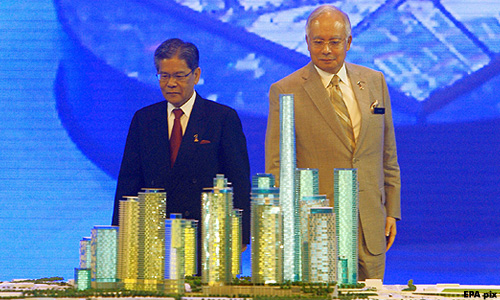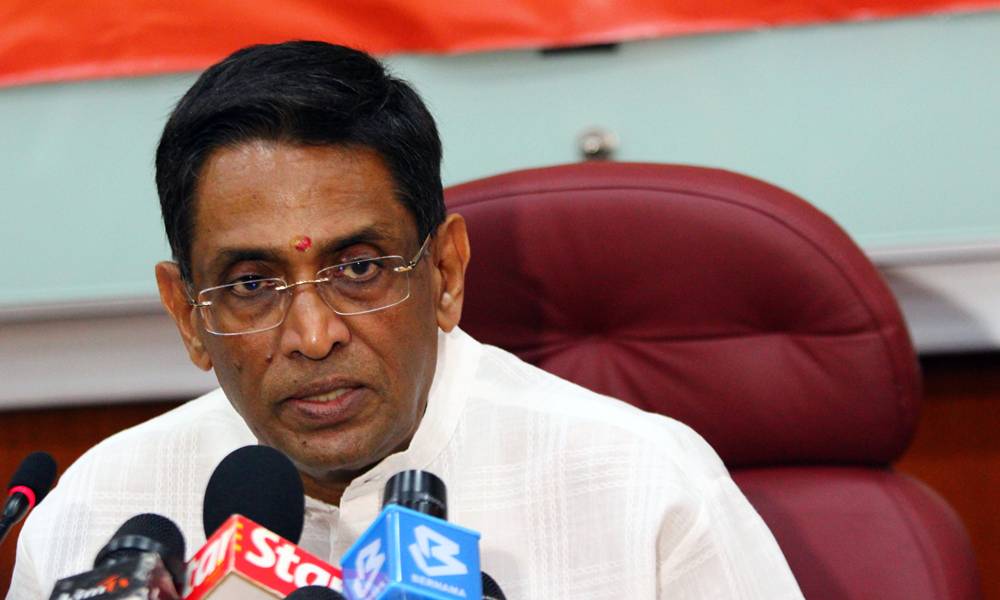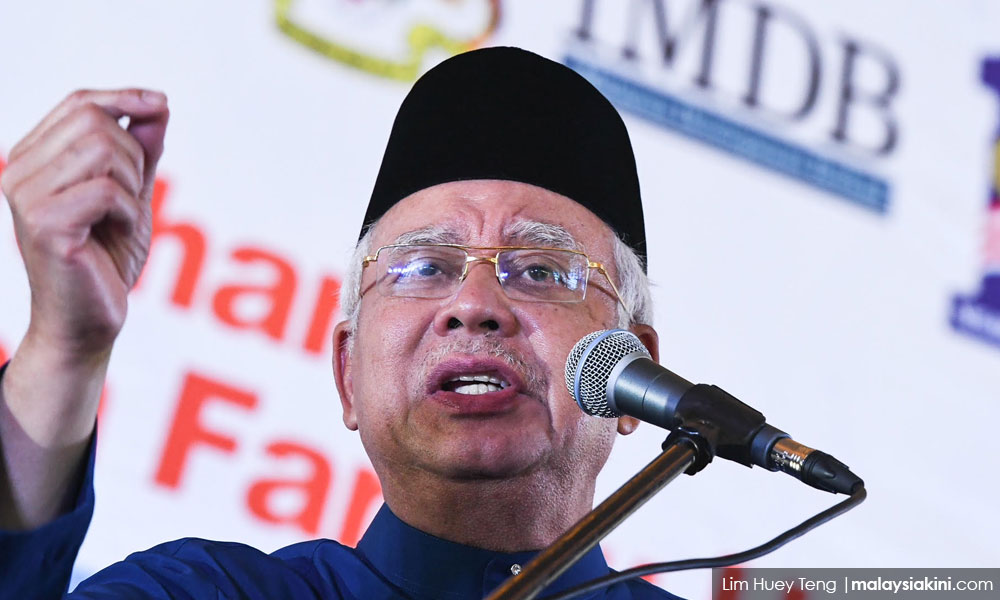Wakil pekerja dilantik sebagai pengarah dalam PERKESO dan juga KWSP - tetapi nampaknya mereka, selaku wakil pekerja mungkin 'tak guna', 'malas' atau 'tak cekap' memastikan wang PERKESO/KWSP milik pekerja tidak disalahgunakan ....harus diingatkan bahawa semua wang sedia ada dalam PERKESO/KWSP adalah milik pekerja atau harus digunakan untuk pekerja...Siapakah wakil pekerja pada 2012 - apa kata mereka? Adakah mereka 'tidak tahu' mengenai pinjaman RM800 juta yang diberikan kepada TRX? Adakah mereka turut setuju memberi pinjaman pada kadar faedah rendah kepada TRX?
Mengapa WAKIL PEKERJA dalam PERKESO tidak sedar dan GAGAL memaklumkan kepada pekerja mengenai pinjaman ini....yang diberikan dengan faedah sangat rendah...lebih kurang 4 %... ?The scenario is frightening. Money from the Social Security Organisation (read, money from the workers of Malaysia) was loaned in 2012 to TRX has disappeared.
Kalau SOCSO/PERKESO mahu berikan pinjaman dengan kadar faedah begitu rendah - lebih lojik pinjaman ini diberikan kepada pekerja untuk pembelian rumah... di mana pinjaman ini selamat, kerana jika peminjam gagal membayar balik, pihak PERKESO/SOCSO boleh jual rumah dan dapat balik jumlah yang dipinjam serta faedah yang perlu dibayar ...tak rugi pun......when it involved a whopping RM800 million? (The loan attracted an interest rate of 4.041 percent per annum with a tenure of 10 years, which is paid on an amortised basis – much less than the interest from commercial banks.)
Justeru, bila wang dalam PERKESO/KWSP digunakan secara salah...sebagi pinjaman kepada pihak syarikat lain pada kadar faedah yang sangat rendah...dan dimana ada risiko dari segi pulangan ..., saya ingin menyatakan bahawa 'wakil pekerja' dalam badan Pengarah harus dipersalahkan ...
Setahu saya, wakil pekerja ini biasanya dari MTUC - jadi adakah MTUC setuju dengan pinjaman ini kepada TRX? Atau adakah MTUC dan pihak union lain yang menjadi ahli MTUC tidak dimaklumkan oleh 'wakil pekerja' dalam PERKESO?SOCSO ini?
Siapakah yang memilih wakil pekerja ini? Adakah MTUC yang pilih ...atau adakah kerajaan semasa yang memilih 'wakil pekerja' tanpa memberikan hak kepada MTUC memilih 'wakil'? Political appointee ...atau wakil yang dipilih secara demokratik oleh MTUC?
Jika 'political appointee', ini harus ditukar...dan pemilihan wakil pekerja di dalam SOCSO/PERKESO dan juga KWSP/EPF mesti dilakukan secara demokratik oleh pekerja. Kini MTUC dan CUEPACs yang mungkin memilih - justeru hak mengundi dan memilih ditangan kesatuan sekerja dalam MTUC dan/atau CUEPACs ...TETAPI persatuan Kesatuan-Kesatuan ini pada masa ini tidak mewakili semua kesatuan sekerja dalam Malaysia. MTUC, pada masa ini hanya mewakili lebih kurang 30% kesatuan sekerja - dan sukar juga untuk kesatuan lain masuk jadi ahli, contohnya NUFAM yang mahu jadi ahli telah dinafikan keahlian...
According to the Trade Union Affairs Department, only 875,193, or six percent, of the 14.5 million workers in the country, are currently union members. Union membership in the private sector also shows a marked decrease, dropping from 433,702 in 2009 to 359,206 in 2017. - The state of the labour movement in Malaysia
Lebih kurang 6 peratus pekerja adalah ahli kesatuan sekerja di Malaysia, dan dikalangan pekerja swasta bilangan ahli kesatuan mungkin lebih kurang 4-5% sahaja, dan semakin berkurangan. Jadi, haruskah kita mempunyai cara perlantikan pekerja yang lebih demokratik?
Haruskah wakil pekerja dalam PERKESO yang membenarkan PERKESO memberi pinjaman RM800 juta kepada TRX pada kadar faedah yang sangat rendah harus dikenalpasti dan diambil tindakan? Mengapa mereka setuju? Adakah mereka SEDAR bahawa mereka telah setuju? ATAU, lebih serius jika PINJAMAN ini telah dilakukan tanpa pengetahuan mereka atau Badan Pengarah PERKESO?
Saya menunggu jawapan 'wakil pekerja' dalam PERKESO bila keputusan ini dibuat?
* Sedih sekali jika 'wakil pekerja' hanya berminat dengan pangkat dan wang yang mereka terima secara peribadi...tetapi gagal menjaga hak dan kepentingan pekerja. Wakil pekerja harus sentiasa lapur kepada pekerja ...berbincang dengan pekerja ...dan benar-benar menjadi wakil pekerja dalam PERKESO dan KWSP?
Adakah MTUC sudah bersuara dalam isu RM800 juta ini? Adakah UNION lain(khususnya kesatuan kebangsaan/negeri/regional sudah bersuara? Tidakkah mereka tahu mereka ada TUGAS menjaga hak, kepentingan, nasib semua Pekerja di Malaysia?
Mission impossible: How our Socso money got loaned to TRX

The question: “Where has the US$3 billion (RM12 billion) raised in 2012 for the purpose of investing in Tun Razak Exchange gone to?”
- Finance Minister Lim Guan Eng
The reply: “So far, the loan is government-guaranteed and we managed to get the returns as promised which is twice a year. They have also started to repay the principal payment. The coupon payment was twice a year, normally in April and November and the recent payment was paid on time. So, all this while they have honoured (payments), meaning there is no lapse in payment.”
- Socso CEO Mohammed Azman Aziz Mohammed, in stating that TRX City Sdn Bhd honoured its repayment schedules for the RM800 million loan.
COMMENT | The scenario is frightening. Money from the Social Security Organisation (read, money from the workers of Malaysia) was loaned in 2012 to TRX has disappeared.
Yes, someone in the 1MDB took it – perhaps to buy a yacht or pay for their casino gigs. The money belongs to us – you and I, who part with deductions from our salaries every month for a scheme under the employees’ social security scheme.
It is easy to dismiss this loan transaction as “guaranteed by the government” and hence, believing that there is nothing to fear.
But one must realise that if there is a default, it will once again be the taxpayers who will have to foot the bill. The workers who pay taxes are getting the wrong end of the stick. It is a case of heads you win, tails we lose.
Why were the loans given in the first place? Socso is not a bank or a financial institution. Neither is it in the moneylending business, nor does it have a money lending licence. There are explicit provisions in the preamble to Socso’s statute book which reads: “An Act to provide social security in certain contingencies and to make provision for certain other matters in relation to it.”
Does the law allow Socso to go into such business or transaction? The answer is no. Did it breach the regulations governing the use of its funds? The answer is likely yes.
Who pulled the trigger?
Having perused the act in totality, there are no provisions for Socso to give any loans except for loans or scholarships to a dependent child of an insured person. So how does the RM800 million fit into the scheme of this transaction?
There is one catch-all clause that may provide some clue as to the compelling reasons for Socso to provide loans.
Section 71 of the Act outlines how its monies should be spent. Subsection (ix) says it can be used for “purposes as may be authorised” by the minister in consultation with the finance minister.

Therefore, is it safe to assume that then-human resources minister Dr S Subramaniam and then-finance minister Najib Abdul Razak had been consulted and gave their consent to the loan?
But wasn’t there a whimper of objection from any quarter, because the money belonged to the workers? You and I could not have raised it, because the transaction only appeared in public domain a few years later.
What were the board of directors doing? Didn’t they approve the loan? Or did they pass the buck to the management by claiming that they were in the dark?
Shouldn’t a “board paper” have been prepared for discussion by the directors, especially when it involved a whopping RM800 million? (The loan attracted an interest rate of 4.041 percent per annum with a tenure of 10 years, which is paid on an amortised basis – much less than the interest from commercial banks.)
So, were there voices of objection or dissent, or was this case of the usual and unanimous shouts of “setuju” (yea) or the act of angkat tangan (raising hands) à la local council decisions?
If this was the case, shouldn’t the entire board be held responsible? Wasn’t it a breach of fiduciary duties as directors? Will they use “we were instructed” as an excuse? They can’t. Aren’t they are supposed to act independently as stakeholders of workers’ money?

Shouldn’t they have told the ministers that it could not be done? (There have been several CEOs and boards which had in the past put their feet down despite insistent requests from various quarters, the prime minister included.)
In any organisation, the statute book is the guiding light. If the necessities and provisions are not considered by those in authority, they might as well throw the rule book out of the window and allow jungle law to take effect.
The long tentacles of 1MDB have stretched far and wide for funds. Government agencies which are flushed with funds became soft targets for the vultures who wanted money from every nook and corner to cover their failures and shortcomings.
The public has a right to know the events and discussions leading to the loan. The current human resources minister should direct Socso to make public the board papers (if any), the board minutes and the discussions that followed whereby the board agreed to release the money.
By the way, RM800 million is not someone’s weekend rojak money. Let us, the taxpayers decide if the directors of the board are fit to remain. Their dereliction of duties is something serious and must be looked at intensely and intensively.
R NADESWARAN contributed because all his working life, Socso has a “once you get in, you can’t get out” policy. His and your money are part of the RM800 million loan. Comments: citizen.nades22@gmail.com.
The views expressed here are those of the author/contributor and do not necessarily represent the views of Malaysiakini. - Malaysiakini, 5/8/2018
- Finance Minister Lim Guan Eng
The reply: “So far, the loan is government-guaranteed and we managed to get the returns as promised which is twice a year. They have also started to repay the principal payment. The coupon payment was twice a year, normally in April and November and the recent payment was paid on time. So, all this while they have honoured (payments), meaning there is no lapse in payment.”
- Socso CEO Mohammed Azman Aziz Mohammed, in stating that TRX City Sdn Bhd honoured its repayment schedules for the RM800 million loan.
COMMENT | The scenario is frightening. Money from the Social Security Organisation (read, money from the workers of Malaysia) was loaned in 2012 to TRX has disappeared.
Yes, someone in the 1MDB took it – perhaps to buy a yacht or pay for their casino gigs. The money belongs to us – you and I, who part with deductions from our salaries every month for a scheme under the employees’ social security scheme.
It is easy to dismiss this loan transaction as “guaranteed by the government” and hence, believing that there is nothing to fear.
But one must realise that if there is a default, it will once again be the taxpayers who will have to foot the bill. The workers who pay taxes are getting the wrong end of the stick. It is a case of heads you win, tails we lose.
Why were the loans given in the first place? Socso is not a bank or a financial institution. Neither is it in the moneylending business, nor does it have a money lending licence. There are explicit provisions in the preamble to Socso’s statute book which reads: “An Act to provide social security in certain contingencies and to make provision for certain other matters in relation to it.”
Does the law allow Socso to go into such business or transaction? The answer is no. Did it breach the regulations governing the use of its funds? The answer is likely yes.
Who pulled the trigger?
Having perused the act in totality, there are no provisions for Socso to give any loans except for loans or scholarships to a dependent child of an insured person. So how does the RM800 million fit into the scheme of this transaction?
There is one catch-all clause that may provide some clue as to the compelling reasons for Socso to provide loans.
Section 71 of the Act outlines how its monies should be spent. Subsection (ix) says it can be used for “purposes as may be authorised” by the minister in consultation with the finance minister.

Therefore, is it safe to assume that then-human resources minister Dr S Subramaniam and then-finance minister Najib Abdul Razak had been consulted and gave their consent to the loan?
But wasn’t there a whimper of objection from any quarter, because the money belonged to the workers? You and I could not have raised it, because the transaction only appeared in public domain a few years later.
What were the board of directors doing? Didn’t they approve the loan? Or did they pass the buck to the management by claiming that they were in the dark?
Shouldn’t a “board paper” have been prepared for discussion by the directors, especially when it involved a whopping RM800 million? (The loan attracted an interest rate of 4.041 percent per annum with a tenure of 10 years, which is paid on an amortised basis – much less than the interest from commercial banks.)
So, were there voices of objection or dissent, or was this case of the usual and unanimous shouts of “setuju” (yea) or the act of angkat tangan (raising hands) à la local council decisions?
If this was the case, shouldn’t the entire board be held responsible? Wasn’t it a breach of fiduciary duties as directors? Will they use “we were instructed” as an excuse? They can’t. Aren’t they are supposed to act independently as stakeholders of workers’ money?

Shouldn’t they have told the ministers that it could not be done? (There have been several CEOs and boards which had in the past put their feet down despite insistent requests from various quarters, the prime minister included.)
In any organisation, the statute book is the guiding light. If the necessities and provisions are not considered by those in authority, they might as well throw the rule book out of the window and allow jungle law to take effect.
The long tentacles of 1MDB have stretched far and wide for funds. Government agencies which are flushed with funds became soft targets for the vultures who wanted money from every nook and corner to cover their failures and shortcomings.
The public has a right to know the events and discussions leading to the loan. The current human resources minister should direct Socso to make public the board papers (if any), the board minutes and the discussions that followed whereby the board agreed to release the money.
By the way, RM800 million is not someone’s weekend rojak money. Let us, the taxpayers decide if the directors of the board are fit to remain. Their dereliction of duties is something serious and must be looked at intensely and intensively.
R NADESWARAN contributed because all his working life, Socso has a “once you get in, you can’t get out” policy. His and your money are part of the RM800 million loan. Comments: citizen.nades22@gmail.com.
The views expressed here are those of the author/contributor and do not necessarily represent the views of Malaysiakini. - Malaysiakini, 5/8/2018
No comments:
Post a Comment